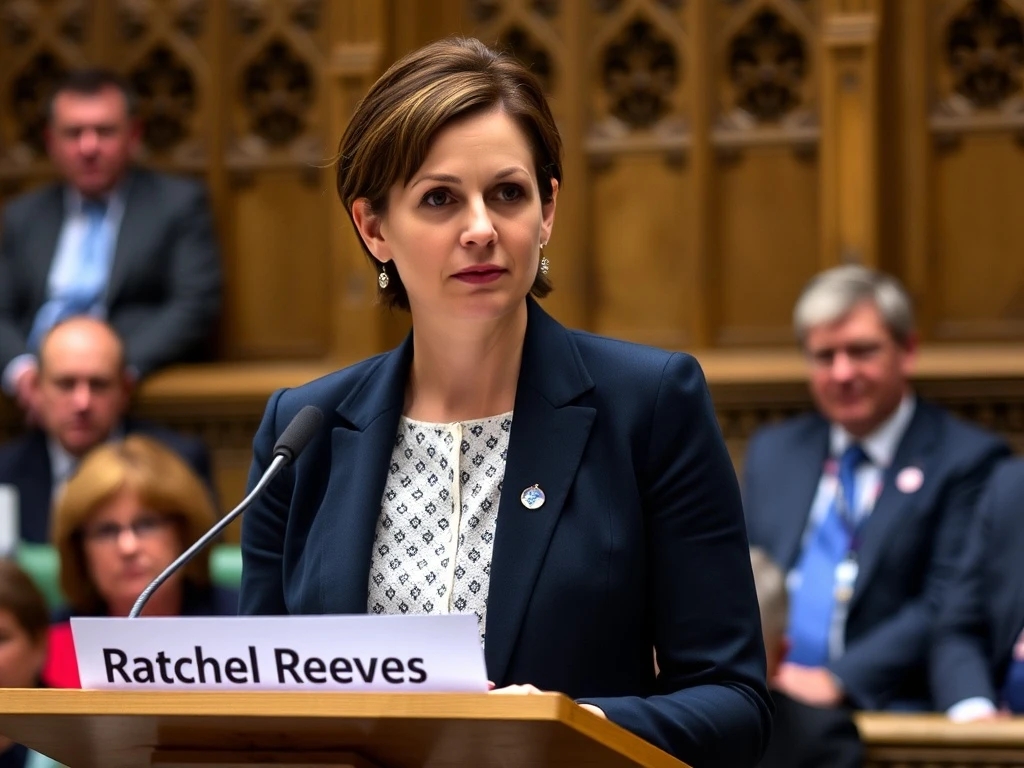Recent events have placed **Rachel Reeves**, the UK’s Shadow Chancellor, under intense scrutiny. She was compelled to correct the official parliamentary record, having presented inaccurate figures to MPs and peers. This situation raises significant questions regarding her command of crucial economic details. For business leaders and entrepreneurs, understanding the accuracy of government figures is paramount. These corrections come at a critical juncture, especially with the upcoming autumn Budget looming.
Rachel Reeves’s Credibility Under Scrutiny
The Treasury confirmed Hansard, the official record of parliamentary proceedings, was amended. This followed errors made by **Rachel Reeves** during recent committee hearings. In one exchange, she misstated figures concerning the Local Government Pension Scheme (LGPS). Reeves told MPs the £425bn scheme was managed by “96 different administering authorities.” She also claimed she intended to consolidate this into “eight pools” as part of her reforms. Officials later clarified the true figures were 86 authorities and a planned consolidation into six pools. These discrepancies, though seemingly minor, highlight a need for precision when discussing large-scale financial reforms.
Furthermore, during an appearance before the House of Lords economic affairs committee, **Rachel Reeves** misquoted labour market data. She stated, “20% of people of working age are economically inactive and we have an unemployment rate of just over 4%.” The Treasury later clarified these figures. The Office for National Statistics (ONS) actually puts economic inactivity at 21% and the unemployment rate at 4.7%. Such inaccuracies, first reported by the Mail on Sunday, emerge at a sensitive time. Reeves faces mounting pressure as she prepares her first autumn Budget.
Unpacking the Pension Reform Figures
The Local Government Pension Scheme (LGPS) represents a substantial portion of the UK’s public sector pensions. Its management involves complex structures. **Rachel Reeves** proposed reforms aimed at boosting investment and efficiency. However, misstating the number of administering authorities (96 versus 86) and the planned number of consolidated pools (eight versus six) can undermine confidence. Accurate communication is essential when proposing changes to such a vast financial entity. Investors and scheme members rely on precise information to make informed decisions. Consequently, these corrections become more than just numerical adjustments; they impact trust in the reform process itself.
Economic Data Discrepancies Explained
Accurate economic data forms the bedrock of sound policy-making. The slight differences in the ONS figures cited by **Rachel Reeves** might appear small. Yet, even a one percent difference in economic inactivity represents hundreds of thousands of people. Similarly, a 0.7% difference in the unemployment rate can reflect significant shifts in the labour market. Policymakers use these statistics to gauge the health of the economy. They also use them to formulate strategies for growth and employment. Therefore, precise reporting is critical for both public understanding and effective governance. This situation underscores the need for meticulous detail from high-ranking officials.
A Pattern of Corrections for Rachel Reeves
This is not the first instance where the Shadow Chancellor has been forced into a public correction. In February, **Rachel Reeves** had to revise remarks about wage growth. She claimed that “since the election we’ve seen year-on-year wages after inflation growing at their fastest rate.” Treasury officials later clarified that real wage growth was running at its fastest pace in three years, not at a record high. This earlier correction already raised eyebrows. It suggested a pattern of overstatement or misinterpretation of economic indicators.
Last year, **Rachel Reeves** also faced scrutiny regarding her CV. She had claimed to have worked as an economist at Bank of Scotland. However, the lender stated this role was misdescribed. She also overstated her time at the Bank of England. These repeated slip-ups are beginning to fuel criticism. They question her readiness for the demanding Treasury brief. Andrew Griffith, the shadow business secretary, accused Reeves of having a “shocking grasp of detail.” He stressed, “When she’s writing such big cheques with taxpayers’ money, it’s no time to be loose with your numbers.” His comments reflect a growing concern among political observers.
The Chancellor’s Role and Public Trust
The role of Chancellor of the Exchequer demands exceptional precision and an unwavering command of financial detail. This individual is responsible for the nation’s economic strategy and public finances. Public trust hinges on the accuracy of their statements. When figures are misquoted, it can erode confidence not only in the individual but also in the institutions they represent. Furthermore, financial markets react sensitively to economic pronouncements. Inaccurate figures can lead to market volatility or mispricing of assets. Therefore, the importance of factual accuracy from **Rachel Reeves** and her counterparts cannot be overstated.
Navigating the Autumn Budget Challenge
The corrections come just weeks before **Rachel Reeves** is due to deliver the autumn Budget. Economists warn she may need to raise as much as £50bn. This is necessary to plug a hole in the public finances. Critics argue this gap has widened due to policies that have dented business confidence and investment. With interest payments on government debt climbing and growth sluggish, speculation mounts. People wonder how she intends to balance the books. She has already ruled out raising income tax, National Insurance, or VAT. This leaves limited options on the table. Potential changes include inheritance tax and capital gains tax. However, these risk fueling significant controversy.
Fiscal Headroom and Economic Realities
Fiscal headroom refers to the amount of money a government has available to spend or cut taxes without breaching its own fiscal rules. Currently, the UK’s fiscal headroom is limited. This means the Chancellor has less flexibility to maneuver. Rising inflation, high energy prices, and global economic uncertainties compound the challenge. These factors constrain economic growth. **Rachel Reeves** must present a Budget that not only addresses the immediate fiscal gap but also fosters long-term economic stability. This task requires a firm grasp of all relevant economic indicators and their potential impacts.
The Broader Implications for Government Transparency
The act of correcting the parliamentary record, Hansard, underscores the importance of government transparency. Hansard serves as the official, verbatim record of all parliamentary proceedings. Its accuracy is paramount for historical documentation, legal purposes, and public accountability. When a senior figure like **Rachel Reeves** must issue a correction, it highlights the rigorous standards expected in public office. The media’s role in fact-checking these statements is also crucial. It ensures that public discourse is based on verifiable facts. This constant scrutiny helps maintain the integrity of democratic processes and fosters a more informed electorate.
Ensuring E-E-A-T in Economic Discourse
In today’s information landscape, the principles of Expertise, Experience, Authoritativeness, and Trustworthiness (E-E-A-T) are vital. This applies especially to economic discourse. When a prominent figure like **Rachel Reeves** speaks on financial matters, her statements carry significant weight. They influence public perception, investor confidence, and policy direction. Therefore, her expertise and authority must be beyond reproach. Factual accuracy underpins all aspects of E-E-A-T. Any perceived lack of detail or repeated errors can undermine trust. This makes it harder for the public and markets to rely on her pronouncements. Ultimately, maintaining a high standard of accuracy builds a foundation of credibility.
For now, **Rachel Reeves** is under immense pressure. She must not only make the numbers add up but also convince both Parliament and the markets that she has a firm grip on them in the first place. The Treasury declined to comment further on the matter. The coming weeks will undoubtedly test her ability to navigate these challenges. Her performance will significantly impact her political future and the nation’s economic trajectory.
Frequently Asked Questions (FAQs)
Q1: What specific figures did Rachel Reeves misquote?
Rachel Reeves misquoted figures related to the Local Government Pension Scheme (LGPS), stating 96 authorities and plans for 8 pools instead of the correct 86 authorities and 6 pools. She also misstated labour market data, citing 20% economic inactivity and 4% unemployment, when the ONS figures were 21% and 4.7% respectively.
Q2: Why is it significant that Rachel Reeves had to correct the parliamentary record?
Hansard, the parliamentary record, is the official and verbatim account of proceedings. Corrections by a senior figure like Rachel Reeves highlight the importance of accuracy in public statements, especially concerning economic matters, and can impact public and market confidence in her command of detail.
Q3: Have there been previous instances of Rachel Reeves making similar errors?
Yes, Rachel Reeves has faced previous corrections. In February, she had to revise remarks about wage growth, and last year, she faced scrutiny for exaggerating elements of her CV, including her roles at Bank of Scotland and the Bank of England.
Q4: How do these errors impact Rachel Reeves’s upcoming autumn Budget?
These errors come at a sensitive time, increasing scrutiny on Rachel Reeves as she prepares her first autumn Budget. With economists warning of a significant fiscal hole, any perceived lack of command over economic details could undermine confidence in her ability to manage the nation’s finances effectively.
Q5: What is the importance of accuracy for a Chancellor or Shadow Chancellor?
Accuracy is paramount for a Chancellor or Shadow Chancellor because their statements directly influence public trust, market stability, and policy decisions. Misinformation, even slight, can have significant economic consequences and erode the credibility of the individual and the government.








